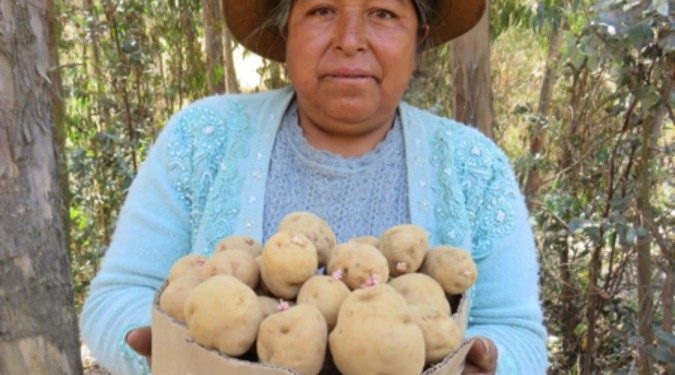As the global population burgeons past 8 billion and climate change makes it harder to grow food, scientists in South America are tapping the power of wild potatoes to breed disease-resistant and resilient varieties that can enable farmers to produce more food while reducing their use of agrochemicals.
The recent release of the International Potato Center’s (CIP) disease-resistant CIP-Matilde variety in Peru is the result of years of work and investment in conserving and studying potato wild relatives and using them to breed potatoes that combine characteristics that consumers want with the wild potatoes’ ability to cope with diseases and climate extremes.
By transferring those attributes into cultivated potatoes through conventional breeding, and working with farmers to select the best ones, CIP is developing potatoes with great potential to improve the food security, income and wellbeing of rural families.
CIP-Matilde is highly resistant to late blight disease, responsible for the historic Irish Potato Famine and an estimated USD 14 billion in potato crop destruction annually. Most farmers control late blight by spraying fungicides on their fields, but for smallholders in developing countries, the cost of those agrochemicals can be prohibitive, and they present risks for the environment and farming families.
“Late blight is a big problem in my area. I usually harvest 70 to 80 sacks of potatoes, but if late blight attacks my field, I may harvest half that much,” said Mariluz Cárdenas, who lives in Huancayo province, high in the Peruvian Andes. “Matilde is an excellent potato because it isn’t affected by late blight, so we harvest more and don’t have to spend much on agrochemicals.”

Scientists bred and selected CIP-Matilde in collaboration with farmers like Ms. Cárdenas with support from the Crop Trust, an international organization working to conserve and use crop diversity and thereby protect global food and nutrition security.
The Crop Trust is supporting comparable work with six other crops on three continents through the “Biodiversity for Opportunities, Livelihoods and Development,” or BOLD, project, which will enable CIP to work with specially trained farmers in Huancayo to grow quality CIP-Matilde seed potatoes for distribution and educate farmers in the region about the variety’s qualities.
Additionally, CIP is working toward the release of a second late blight-resistant variety in Peru in 2023 and has shared breeding materials from the same group as Matilde with research institutions in Ecuador and Kenya to grow and assess them for release as varieties, or use in national potato breeding programs.
“Late blight is a major concern of farmers in Africa’s main potato-growing countries, who spend a significant part of their earnings on agrochemicals to control the disease or risk losing their crop,” said potato breeder Thiago Mendes, who manages the BOLD potato project at CIP. He explained that while evaluating and sharing disease-resistant potatoes with breeding programs in several African countries, CIP is building capacity and raising awareness among scientists about the value of incorporating potato’s wild relatives in breeding.
“Disease-resistant potatoes can be a life saver for farmers. We are also evaluating potatoes resistant to bacterial wilt, which is nearly as destructive and widespread in Africa, and are in the process of screening heat and drought resistant potatoes for future release,” Mendes explained.
“Farmers around the world are facing increasing uncertainty from the effects of climate change,” said Benjamin Kilian, Project Coordinator and Senior Scientist at the Crop Trust. “Pathogens, pests and weeds can cause major crop losses, particularly in the developing world. By adapting our agriculture to these threats – and using the diversity of wild potato relatives to do so – we can help ensure a food-secure future.”
A source: https://www.potatonewstoday.com







